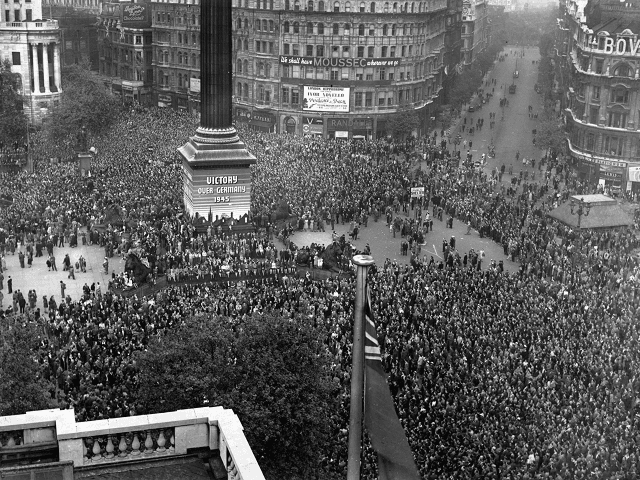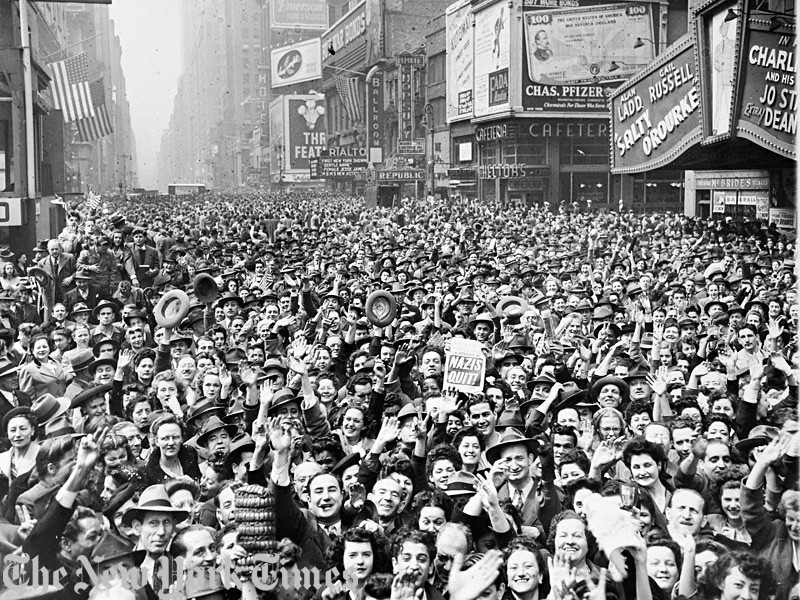Nazi Germany surrendered 72 years ago; remembering VE Day
Daily News Article — Posted on May 10, 2017
(by Christopher Woody, Business Insider) – In the early morning hours of May 7, 1945, the remnants of Nazi Germany’s military leadership signed an unconditional surrender to Allied forces in France. (Hitler had committed suicide on April 30th.)
When the news broke the next day, soldiers and civilians around the world heralded Victory in Europe Day (VE Day) — the Soviet Union would mark Victory Day on May 9 — exuberant about the end of nearly six years of war that had destroyed much of Europe.
When German and Allied military officials gathered again in Berlin near midnight on May 8 to sign surrender documents, the atmosphere in the room was laden with emotional and political weight.
The Germans, characteristically severe, went through the proceedings in a mix of resignation and resentment, while the Soviets, Americans, and other Allies were relieved at the war’s conclusion.
All of them were uncertain what would come next.
Historian Antony Beevor’s sweeping history of the final months on the eastern front, “The Fall of Berlin 1945,” captured the mood in the room as victors and vanquished gathered to bring their conflict to an end:
“Just before midnight the representatives of the allies entered the hall ‘in a two-storey building of the former canteen of the German military engineering college in Karlshorst.’ General Bogdanov, the Russian commander of the 2nd Guards Tank Army, and another Soviet general sat down by mistake on seats reserved for the German delegation.”
“A staff officer whispered in their ears and ‘they jumped up, literally as if stung by a snake’ and went to sit at another table. Western pressmen and newreel cameramen apparently ‘behaved like madmen’. In their desperation for good positions, they were shoving generals aside and tried to push in behind the top table under the flags of the four allies.”
The German delegation then entered the room — its members looking both “resigned” and “imperious.”
Field Marshal Wilhelm Keitel, commander of the Nazi armed forces during the final days of the war, “sat very straight in his chair, with clenched fists,” Beevor wrote. “Just behind him, a tall German staff officer standing to attention ‘was crying without a single muscle of his face moving.'”
Gen. Georgy Zhukov, a senior Soviet commander during the war’s final days, stood to invite the Germans “to sign the act of capitulation.” Keitel, impatient, gestured for the documents to be brought to him. “Tell them to come here to sign,” Zhukov said.
Keitel walked over to sign, “ostentatiously” removing his gloves to do so, unaware that the representative for the chief of Stalin’s secret police, the NKVD, was lingering just over his shoulder.
“‘The German delegation may leave the hall,'” Zhukov said once the signing was complete, Beevor wrote, adding:
“The three men stood up. Keitel, ‘his jowls hanging heavily like a bulldog’s, raised his marshal’s baton in salute, then turned on his heel. As the door closed behind them, it was almost as if everybody would in the room exhaled in unison. The tension relaxed instantaneously. Zhukov was smiling, so was [British Air Chief Marshal Sir Arthur] Tedder. Everybody began to talk animatedly and shake hands. Soviet officers embraced each other with bear hugs.”
“The party which followed went on until almost dawn, with songs and dances. Marshal Zhukov himself danced the Russkaya to loud cheers from his generals. From inside, they could clearly hear gunfire all over the city as officers and soldiers blasted their remaining ammunition into the night sky in celebration. The war was over.” …..
From BusinessInsider .com. Reprinted here for educational purposes only. May not be reproduced on other websites without permission from Business Insider.
Background
GERMANS SIGN UNCONDITIONAL SURRENDER -- Reims, France · May 7, 1945
- Five days after the suicide of Adolf Hitler on April 30, 1945, Adm. Hans-Georg von Friedeburg, an emissary from Grand Admiral Karl Doenitz, arrived in Reims, France, headquarters of Gen. Dwight D. Eisenhower, Supreme Commander Allied Expeditionary Force.
- Friedeburg was tasked with opening surrender negotiations on behalf of Doenitz, head of the rump Nazi state centered on Flensburg, Northern Germany.
- Friedeburg began, Eisenhower remarked later, “playing for time” so that the German armed forces could move as many men as possible behind Anglo-American lines and away from Soviet lines in eastern Europe.
- Friedeburg was brought up short when Eisenhower’s representative, Gen. Walter Bedell Smith, made it plain that the Allies would only accept unconditional surrender on all fronts.
- Doenitz complied with the demand, empowering Col. Gen. Alfred Jodl, Chief of the Operations Staff of the Armed Forces High Command (Oberkommando der Wehrmacht, or OKW), to sign formal papers of surrender in Reims on this date in 1945.
- After affixing his signature, 54-year-old Jodl addressed his audience, saying: “At this hour, we [he meant the German nation and German Armed Forces] can only hope that the victors will be generous.”
- Eisenhower coolly responded that “the German Supreme Commander will appear for the surrender to the Russians at the time and the place that the Russian High Command will designate.”
- Following the signing ceremony Eisenhower informed the Allied War Office in London: “The mission of this Allied Force was fulfilled at 0241, local time, May 7, 1945.”
- The next day in Berlin, May 8, 1945, Field Marshal Wilhelm Keitel, head of the entire OKW, along with representatives of the German Navy and Air Force, signed a second unconditional surrender document in Berlin-Karlshorst.
- Present were Soviet Marshal Georgy Zhukov, signing on behalf of the Supreme Command of the Red Army; British Air Chief Marshal Arthur Tedder, signing as Gen. Eisenhower’s representative; and French Gen. Jean de Lattre de Tassigny, who signed as a witness.
- When Keitel saw the French delegation, he exclaimed, “What? The French too?”
- The war in Europe was over. The German Reich Adolf Hitler had said would endure a thousand years lasted a pitiful and extremely painful dozen. (from The Daily Chronicles of WWII)
VE day (Victory in Europe day) is held on May 8th.
- VE day commemorates the end of the Second World War in Europe, when the forces of Nazi Germany surrendered to the Allied forces (major allies were: Britain, France, U.S. and Soviet Union, and other allies including China).
- The Japanese continued to fight the Americans until August 15th 1945. This date is known as VJ day (Victory in Japan day).
In depth
- The Second World War lasted 6 years from 1939 to 1945. Sixty million people in Europe, Africa and Asia were killed (approximately 20 million were from the Soviet Union - at least half civilians). Over 415,000 U.S. troops were WWII casualties. [Do an internet search for exact numbers.] Six million Jewish people were killed by the Nazis.
- On May 7th 1945, the German High Command signed an unconditional surrender document. To give time for the news to spread to the fighting soldiers, it was agreed that the ceasefire should be at 00.01 on the 9th May. However, enthusiastic journalists broke the news early and spontaneous celebrations began almost immediately.
- Church bells rang out across the land and churches were packed as people went to give thanks to God that, after 6 long years of suffering, victory had finally arrived.
VE Day in Britain, 1945
In Britain people gathered on the streets, many dressed in red, white and blue, to sing and dance, hugging each other, relieved that the war was finally over. Britain and Western Europe decided to celebrate VE day on May 8th with street parties and fancy dress parades for the children.
In Russia VE day is celebrated on May the 9th, the official date the war ended.
Food was rationed, so people had to pool together their coupons to have enough to provide party food. Many of the street party decorations were handmade. Decorations could not be easily bought in war-weary England. Russia and the rest of Eastern Europe stuck to the original agreement and still celebrate on the 9th May.
King George VI and Queen Elizabeth waved to cheering crowds from the balcony of Buckingham Palace. Their daughter, Princess Elizabeth (who became the present Queen Elizabeth II) and her sister Princess Margaret mingled anonymously with the huge crowds in the Mall and Trafalgar Square.

Crowds gathered in London's Trafalgar Square to celebrate Germany's surrender and the end of the war in Europe (VE Day).
Official announcement by Winston Churchill
- British Prime Minister Winston Churchill officially announced the surrender of Nazi Germany which was broadcast around the world to British soldiers. He gave thanks to God and then went to join the Royal family on the balcony of Buckingham palace and told the crowds. “This is your victory… Advance Britannia.”
- The celebrations continued all night with fireworks and bonfires where images of Hitler were burnt and many pubs ran out of alcohol.

